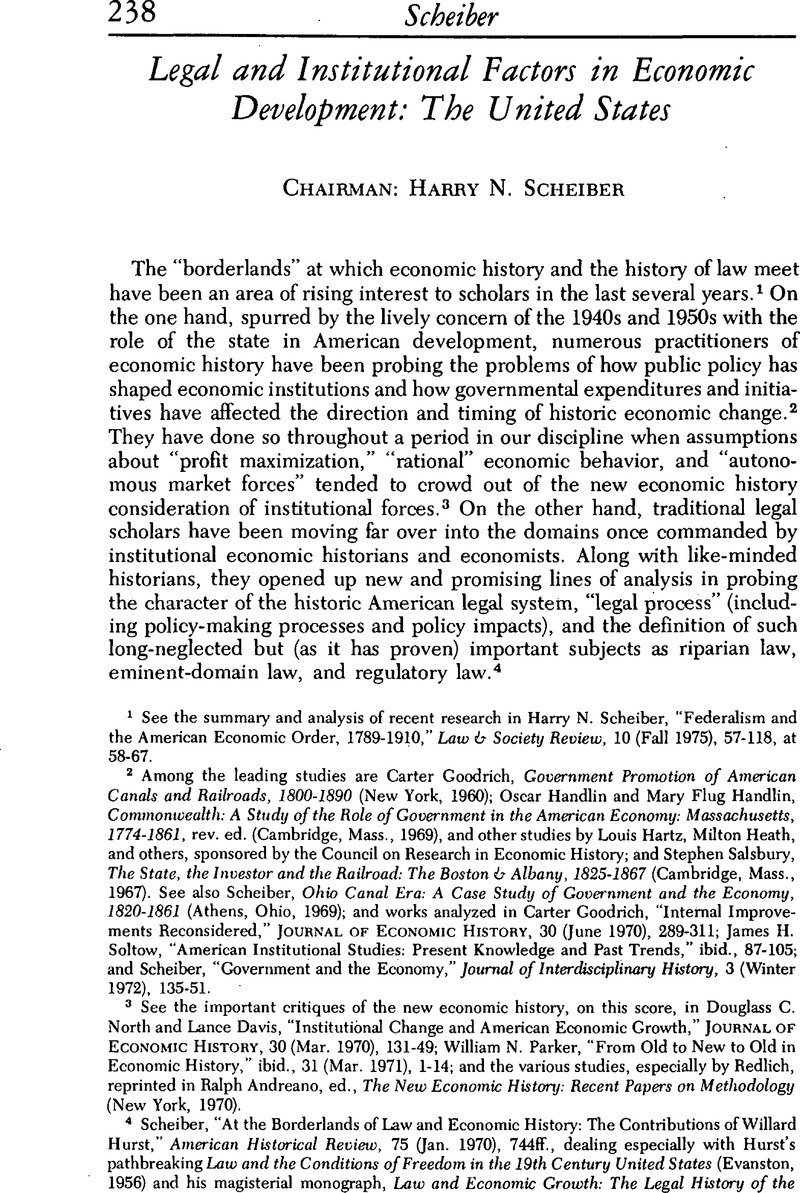No CrossRef data available.
Article contents
Legal and Institutional Factors in Economic Development: The United States
Published online by Cambridge University Press: 11 May 2010
Abstract

- Type
- Summaries of Research Workshops
- Information
- Copyright
- Copyright © The Economic History Association 1977
References
1 See the summary and analysis of recent research in Scheiber, Harry N., “Federalism and the American Economic Order, 1789–1910,” Law & Society Review, 10 (Fall 1975), 57–118, at 58–67.CrossRefGoogle Scholar
2 Among the leading studies are Goodrich, Carter, Government Promotion of American Canals and Railroads, 1800–1890 (New York, 1960)Google Scholar; Handlin, Oscar and Handlin, Mary Flug, Commonwealth: A Study of the Role of Government in the American Economy: Massachusetts, 1774–1861, rev. ed. (Cambridge, Mass., 1969)Google Scholar, and other studies by Louis Hartz, Milton Heath, and others, sponsored by the Council on Research in Economic History; and Salsbury, Stephen, The State, the Investor and the Railroad: The Roston & Albany, 1825–1867 (Cambridge, Mass., 1967)CrossRefGoogle Scholar. See also Scheiber, , Ohio Canal Era: A Case Study of Government and the Economy, 1820–1861 (Athens, Ohio, 1969)Google Scholar; and works analyzed in Goodrich, Carter, “Internal Improvements Reconsidered,” Journal of Economic History, 30 (June 1970), 289–311CrossRefGoogle Scholar; James H. Soltow, “American Institutional Studies: Present Knowledge and Past Trends,” ibid., 87–105; and Scheiber, , “Government and the Economy,” Journal of Interdisciplinary History, 3 (Winter 1972), 135–51.CrossRefGoogle Scholar
3 See the important critiques of the new economic history, on this score, in Douglass C. North and Davis, Lance, “Institutional Change and American Economic Growth,” Journal of Economic History, 30 (Mar. 1970), 131–49CrossRefGoogle Scholar; William N. Parker, “From Old to New to Old in Economic History,” ibid., 31 (Mar. 1971), 1–14; and the various studies, especially by Redlich, reprinted in Ralph Andreano, ed., The New Economic History: Recent Papers on Methodology (New York, 1970).
4 Scheiber, , “At the Borderlands of Law and Economic History: The Contributions of Willard Hurst,” American Historical Review, 75 (Jan. 1970), 744ff.CrossRefGoogle Scholar, dealing especially with Hurst, 's pathbreaking Law and the Conditions of Freedom in the 19th Century United States (Evanston, 1956)Google Scholar and his magisterial monograph, Law and Economic Growth: The Legal History of the Lumber Industry in Wisconsin, 1836–1915 (Cambridge, Mass., 1964)Google Scholar. A useful, rrtore recent and wide-ranging critical survey, flawed by the spurious notion that Hurst and other scholars have accepted “as uniformly benign” the consequences of public policy supportive of rapid growth, is Holt, Wythe, “Then and Now: The Uncertain State of Nineteenth-Century American Legal History,” Indiana Law Review, 7 (1974), 615ff.Google Scholar
5 See especially Morris, , Government and Labor in Early America (New York, 1946)Google Scholar. A useful introduction and survey of colonial studies is provided by Johnson, Herbert, “American Colonial Legal History,” in Vaughan, Alden and Billias, George, eds., Perspectives on Early American History (New York, 1973), p. 250ff.Google Scholar
6 See the recent major study by Nelson, William E., Americanization of the Common Law: The Impact of Legal Change on Massachusetts Society, 1760–1830 (Cambridge, Mass., 1975)Google Scholar.
7 Gallman, “Some Notes on the New Social History,” above, pp. 3–12.
8 See Hurst, Law and the Conditions, passim.
9 References to the literature are provided in McCurdy, Charles W., “Justice Field and the Jurisprudence of Government-Business Relations: Some Parameters of Laissez-faire Constitutionalism, 1863–1897,” Journal of American History, 61 (Mar. 1975), 970–1005.CrossRefGoogle Scholar
10 See Scheiber, “Federalism and the American Economic Order,” pp. 112–13; Cochran, Thomas, “The Paradox of American Economic Growth,” Journal of American History, 61 (Mar. 1975), 934 et passim.CrossRefGoogle Scholar
11 For example, John M. McFaul, The Politics of Jacksonian Finance (Ithaca, 1972) and work cited therein by Bray Hammond and others.
12 The convenor, at least, regrets that no participants in the workshop directed inquiry to or reported research on topics in twentieth-century United States history, even such central issues as are reconsidered in Miller, Arthur Selwyn, The Modern Corporate State: Private Governments and the American Constitution (Westport, Conn., 1976)Google Scholar.


